Dia Azzawi (Iraq, born 1939)Arabian Tents oil on canvas, framed signed "Dia Azzawi" and dated "64" in Arabic (lower left), further signed, dated and titled "Arabic Tents" on the verso, executed in 1964 83 x 65cm (32 11/16 x 25 9/16in).FootnotesArabian Tents A significant early work by Dia Azzawi from 1964 Provenance: Property from a private collection, England Formerly property from the collection of the renowned Iraqi architect Said Ali Madhloom (1921-2017) Acquired directly from the artist by the above "After 1963 it became clear for many artists that one-man shows were more important than group exhibitions with others, which had been the norm in the fifties. What was it like to work during that period? It wasn't really that easy because of the chaos and the politics and the uncertainty for most artists and writers. Some of them left Baghad to work in Beirut, others left to different parts of the world. For me, when I had my own first one-man show, in 1965 at Al-Wasiti Gallery, it was there that I met Kadhim Haider, Ismail Fattah and other artists, it was obvious that I was an artist who tried to be involved in the identity question which had been raised by the Baghdad Group of Modern Art" - Dia Azzawi The present work is a significant early composition by Dia Azzawi and participated in his maiden solo exhibition at Baghdad's Al-Wasiti Gallery in 1965. Replete with rich symbolism, it is from one of the artists earliest bodies of work exploring the role and significance of folkloric and cultural iconography in modern painting. As Saleem Al-Baholy notes, "stylistically, Azzawi's work of the early 1960s remained more figurative with stronger ties to mythology and history, which was the thread that maintained his connection to the Baghdad Group of Modern Art as their anticipated inheritor who could further their goals. Equally, Azzawi's use of colour reflected the inspiration of his teacher Faeq Hassan. He was thus able to negotiate two distinct strands of development in modern Iraqi art: the philosophical abstractions of Iraqi Signs and symbols by the Baghdad Group of Modern Art and Faeq Hassan's mastery of technique" In the present work the artist plays with cultural iconography, abstracting and shifting perspectives on the depiction of typical Bedouin tents, transforming them from mere figural representations into a set of semi-abstracted, interconnected shapes and forms. Azzawi's abiding love and respect for the tonal characteristics of the natural world and for ancient Iraqi imagery shines through in this important early work, which echoes the formal approach and inimitable style of the 'New Vision' school of painting he would come to found in 1969. Azzawi typically incorporates structures and visual symbolism harking back millennia in his paintings, which is evident here in the pseudo-figurative form depicted in the composition, which recalls ancient Mesopotamian bass-reliefs and their mythological imagery. Azzawi started his artistic career in 1964, after graduating from the Institute of Fine Arts in Baghdad and completing a degree in archaeology from Baghdad University in 1962. His studies of ancient civilizations and Iraqi heritage had a profound impact on his art, and a key objective in the early formation of his artistic style was to link the visual culture of the past to the present. In 1969, Azzawi formed the New Vision Group (al-Ru'yya al-Jadidah), uniting fellow artists ideologically and culturally as opposed to stylistically. The group's manifesto, Towards a New Vision, highlighted an association between art and revolution, and sought to transcend the notion of a 'local style'—coined by the Baghdad Modern Art Group—by broadening the parameters of local culture to include the entire Arab world.
Dia Azzawi (Iraq, born 1939)Arabian Tents oil on canvas, framed signed "Dia Azzawi" and dated "64" in Arabic (lower left), further signed, dated and titled "Arabic Tents" on the verso, executed in 1964 83 x 65cm (32 11/16 x 25 9/16in).FootnotesArabian Tents A significant early work by Dia Azzawi from 1964 Provenance: Property from a private collection, England Formerly property from the collection of the renowned Iraqi architect Said Ali Madhloom (1921-2017) Acquired directly from the artist by the above "After 1963 it became clear for many artists that one-man shows were more important than group exhibitions with others, which had been the norm in the fifties. What was it like to work during that period? It wasn't really that easy because of the chaos and the politics and the uncertainty for most artists and writers. Some of them left Baghad to work in Beirut, others left to different parts of the world. For me, when I had my own first one-man show, in 1965 at Al-Wasiti Gallery, it was there that I met Kadhim Haider, Ismail Fattah and other artists, it was obvious that I was an artist who tried to be involved in the identity question which had been raised by the Baghdad Group of Modern Art" - Dia Azzawi The present work is a significant early composition by Dia Azzawi and participated in his maiden solo exhibition at Baghdad's Al-Wasiti Gallery in 1965. Replete with rich symbolism, it is from one of the artists earliest bodies of work exploring the role and significance of folkloric and cultural iconography in modern painting. As Saleem Al-Baholy notes, "stylistically, Azzawi's work of the early 1960s remained more figurative with stronger ties to mythology and history, which was the thread that maintained his connection to the Baghdad Group of Modern Art as their anticipated inheritor who could further their goals. Equally, Azzawi's use of colour reflected the inspiration of his teacher Faeq Hassan. He was thus able to negotiate two distinct strands of development in modern Iraqi art: the philosophical abstractions of Iraqi Signs and symbols by the Baghdad Group of Modern Art and Faeq Hassan's mastery of technique" In the present work the artist plays with cultural iconography, abstracting and shifting perspectives on the depiction of typical Bedouin tents, transforming them from mere figural representations into a set of semi-abstracted, interconnected shapes and forms. Azzawi's abiding love and respect for the tonal characteristics of the natural world and for ancient Iraqi imagery shines through in this important early work, which echoes the formal approach and inimitable style of the 'New Vision' school of painting he would come to found in 1969. Azzawi typically incorporates structures and visual symbolism harking back millennia in his paintings, which is evident here in the pseudo-figurative form depicted in the composition, which recalls ancient Mesopotamian bass-reliefs and their mythological imagery. Azzawi started his artistic career in 1964, after graduating from the Institute of Fine Arts in Baghdad and completing a degree in archaeology from Baghdad University in 1962. His studies of ancient civilizations and Iraqi heritage had a profound impact on his art, and a key objective in the early formation of his artistic style was to link the visual culture of the past to the present. In 1969, Azzawi formed the New Vision Group (al-Ru'yya al-Jadidah), uniting fellow artists ideologically and culturally as opposed to stylistically. The group's manifesto, Towards a New Vision, highlighted an association between art and revolution, and sought to transcend the notion of a 'local style'—coined by the Baghdad Modern Art Group—by broadening the parameters of local culture to include the entire Arab world.
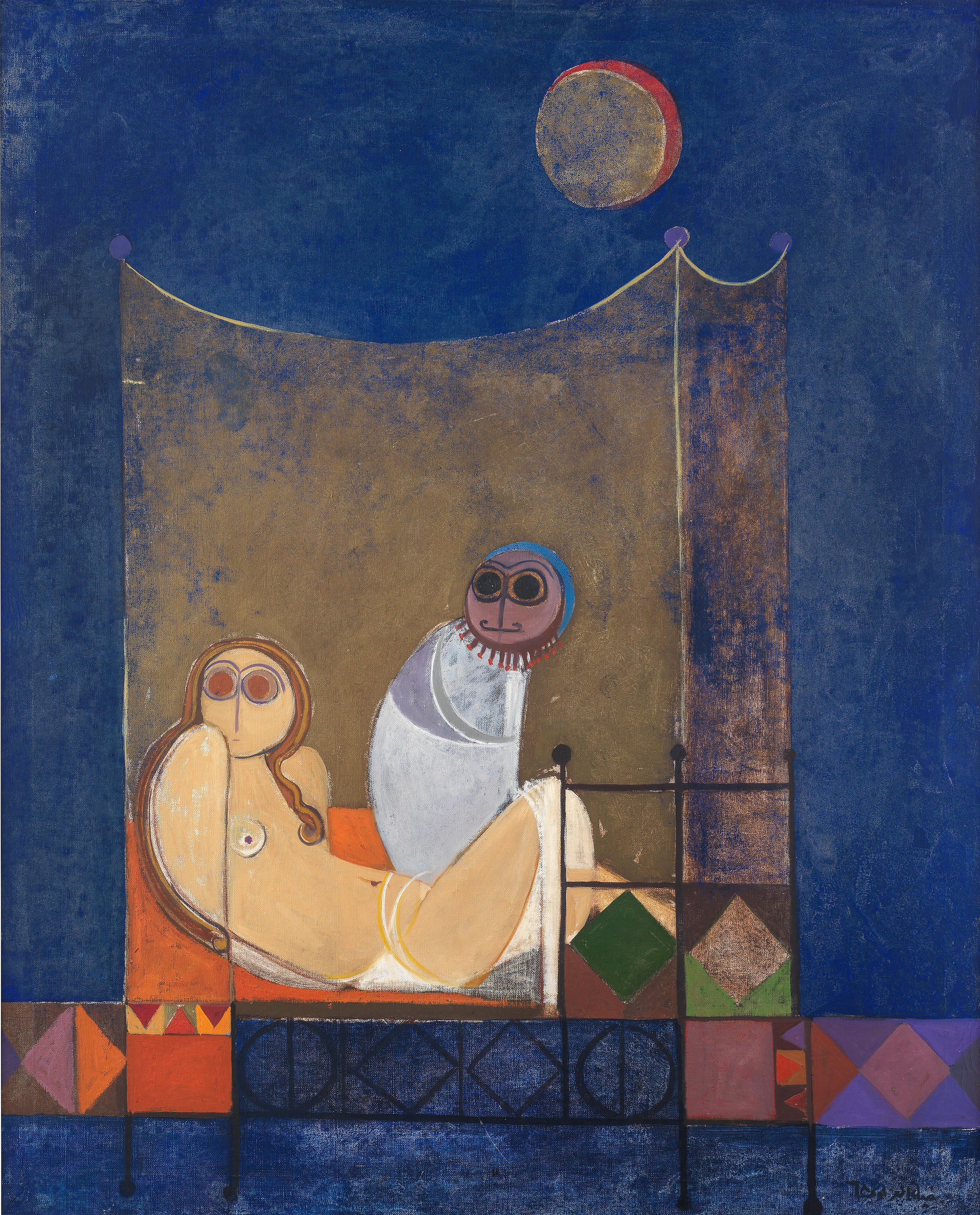
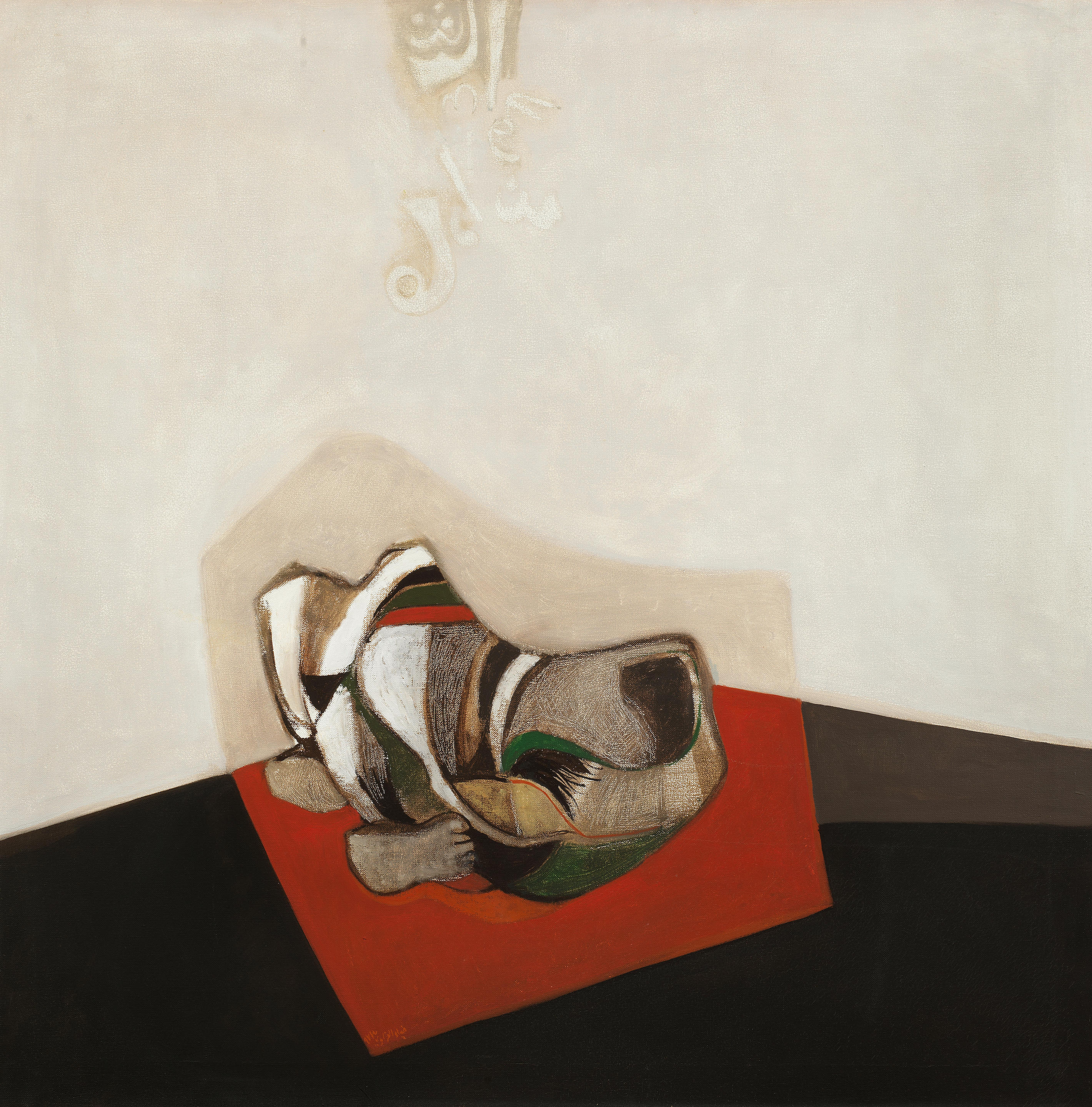
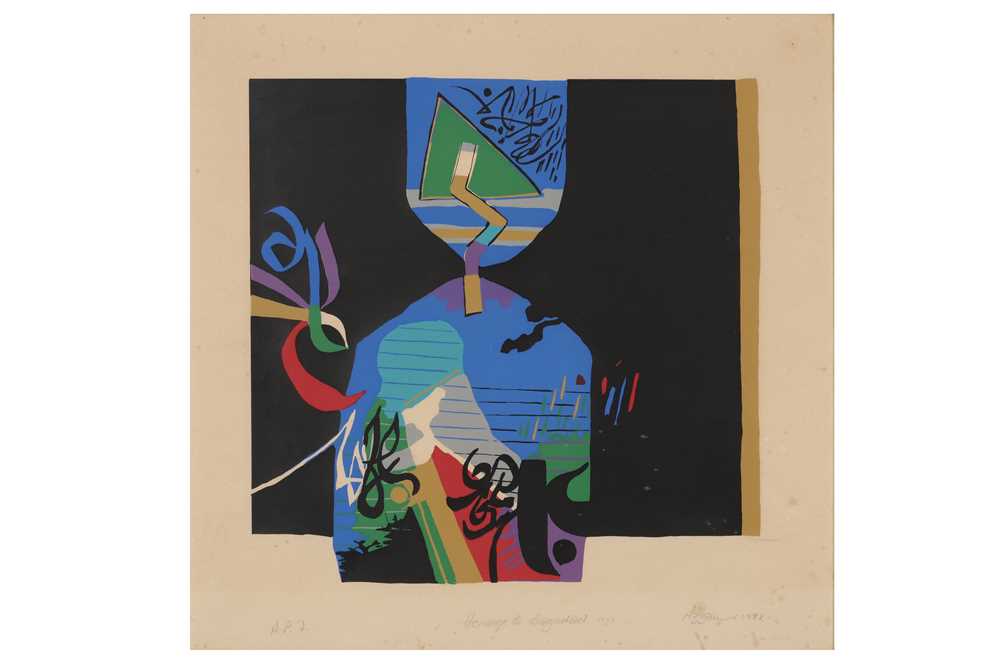

.jpg)

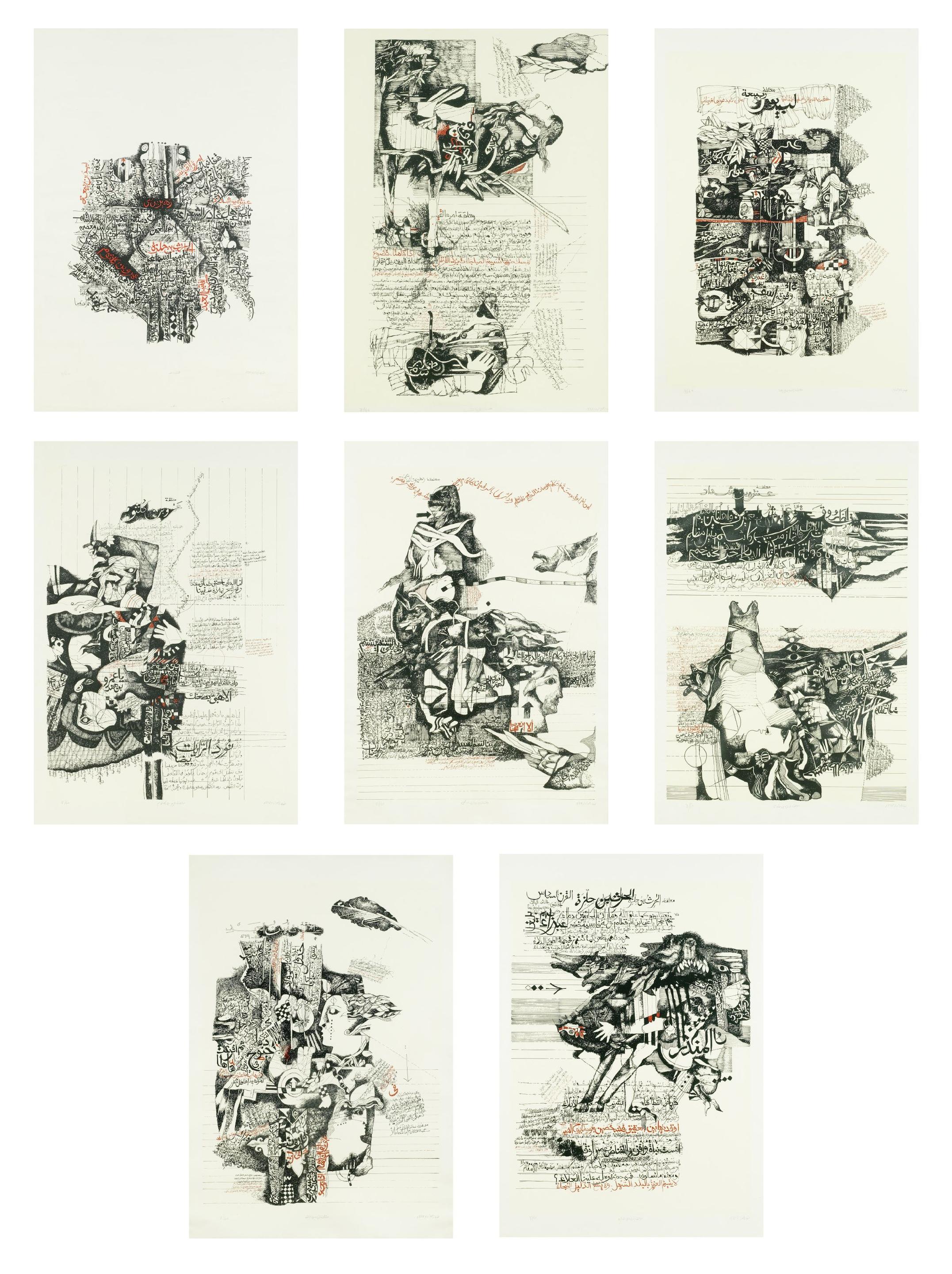
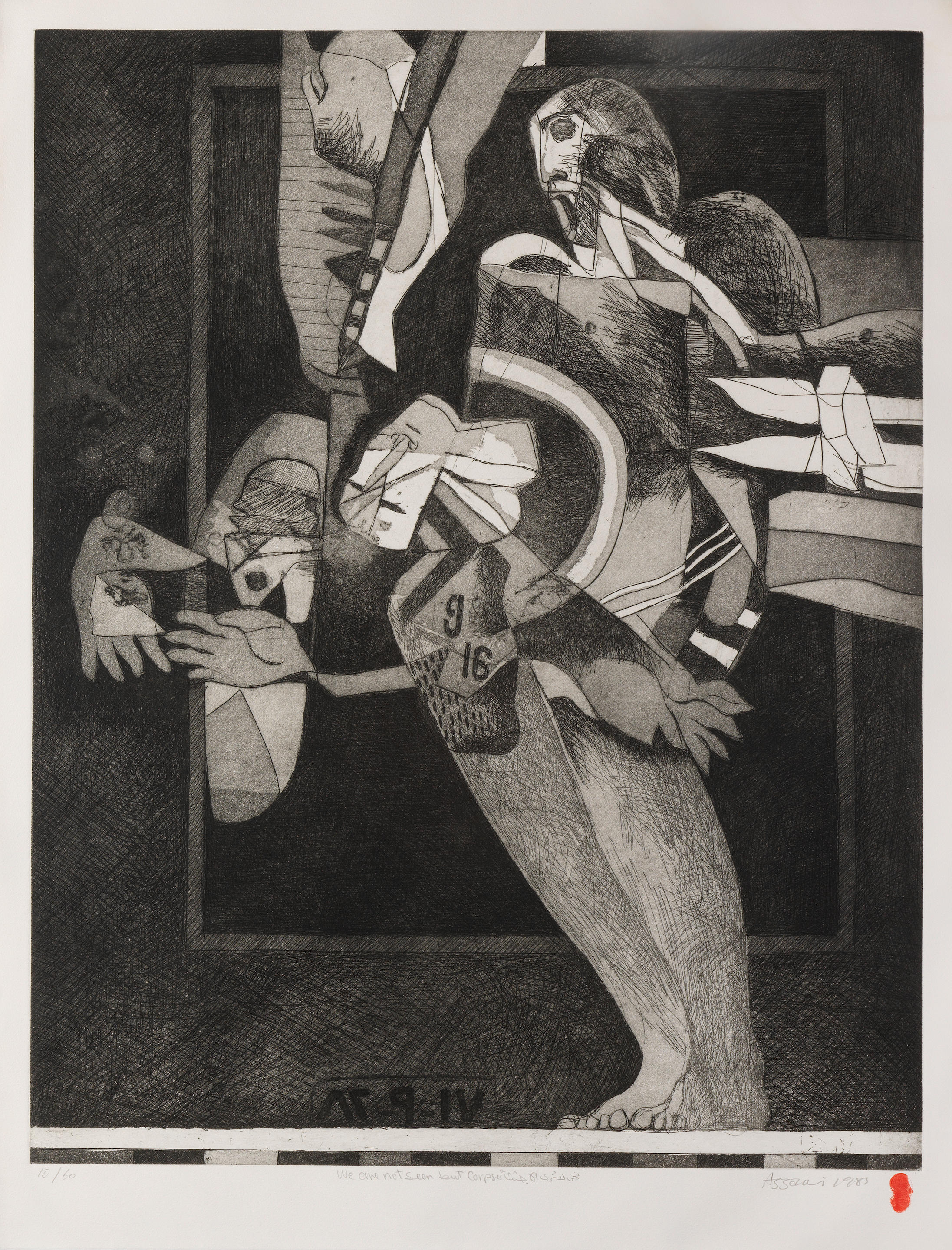







Testen Sie LotSearch und seine Premium-Features 7 Tage - ohne Kosten!
Lassen Sie sich automatisch über neue Objekte in kommenden Auktionen benachrichtigen.
Suchauftrag anlegen